Other Staunch Characters
Information on many of the prinicpal players in the Beales’ lives is often few and far between. If you have additional relevant biographical information or photos you would like to contribute, please contact me. I welcome your feedback.
Bachrach, Burt
In the documentary, Little Edie mistakenly refers to Burt as the photographer that took her photo that hung in the window of the Bachrach Photography Studio on Madison Avenue; her father supposedly smashed the window in anger of seeing his daughter’s photo displayed. Burt Bachrach is, of course, a famous composer and musician. She more than likely meant Bradford or Fabian Bachrach, who were photographing at the family studio at the time. Bachrach is one of the most respected photography studios in America, with a long list of important clients. Fabian took the official portrait of John F. Kennedy, and also photographed Jacqueline. For more information visit www.bachrachportraits.com.
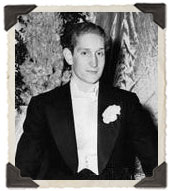
Beale, Bouvier, Sr. (1922-1994)
Bouvier, Sr. (aka “Buddy”) was the youngest of the three children of Edith and Phelan Beale. He lived in the historic 1906 Italian Renaissance-style home called “Cedarcroft” in Glen Cove, NY. He graduated from Yale, and became a partner with the law firm of Walker and Beale. Buddy played an active role in trying to persuade the Beale women to leave Grey Gardens. As such, Edie claimed that it was Buddy that arranged for the Village of East Hampton to raid the home. After Jackie and Lee stepped in to repair the home, he reluctantly paid the back property taxes on the property. He had three children with his wife, Katherine: Bouvier, Jr., Nicholas, and Christopher. Chistopher said his father was “a very handsome, and vain, man with a true love of life (family, food, wine, tennis, duck hunting and travel, not necessarily in that order). I gave the eulogy at his funeral. He was really an atheist, if not a nihilist. Karl Marx had it right about religion, according to Pops. With his year-round tan, he was revered at the Piping Rock Club (where he spent weekends when not at Jones Beach or Bridgehampton). He was a character and fun to sit with at dinner while he regaled his guests with anecdotes.”
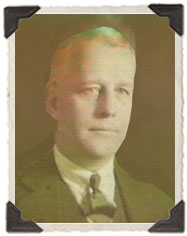
Beale, Phelan, Sr. (1881-1956)
Phelan Beale, Sr. was a New York lawyer, financier, and avid sportsman. He was an attorney with the firm of Big Edie’s father (Major Bouvier), Bouvier and Beale. Mr. Beale was born in Chattanooga, but spent his early life in Montgomery, Alabama. He graduated from the University of the South in 1902 and from Columbia Law School in 1905. A grandson of John D. Phelan of the Alabama Supreme Court, Mr. Beale was a past president of the Southern Society of the City of New York. He was a member of the Maidstone and Devon Clubs of East Hampton. He owned a large hunting preserve known as the Grey Goose Gun Club of Cedar Point, southeast of Shelter Island, on Long Island. In 1937 he bought an adjoining abandoned lighthouse from the Government. He married Edith Bouvier Beale (he was 14 years her senior) in 1917, in an elaborate ceremony attended by over 2,000 people at St. Patrick’s Cathedral in New York City. The initial years of their marriage were spent living in Manhattan on Madison Avenue and at an extravagant Park Avenue apartment (repleat with nurse and maid); in 1921 he bought his wife a luxurious Benz limousine and presented it to her along with a chauffer. Although Phelan did not go bankrupt in the Stock Market Crash of 1929, he did gradually run out of money. In a somber letter written shortly before he divorced her, Phelan asked Big Edie to hide the financial truth from their daughter. “She will think we’re at the poorhouse,” he wrote, “it will rob all her joy.” Phelan left Edith in 1934 and moved to his hunting lodge. He later divorced her in 1946 by telegram from Mexico (Little Edie referred to it as a “fake Mexican divorce” because it was not recognized by the Catholic Church). Edith received child support, but no form of alimony. He married Dorothy D. Durham of Poplarville, Mississippi in 1947 (they did not have children). Actor Ken Howard portrays him in the HBO movie.
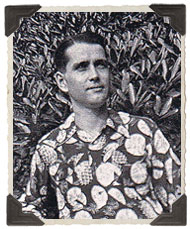
Beale, Phelan, Jr. (1920-1993)
Phelan Beale, Jr. (aka “Phe”) was the middle child of Edith and Phelan Beale. Described as quiet and gentle, he preferred to let his brother, Bouvier, play the most active role in persuading his mother and sister to leave Grey Gardens. He studied journalism at Columbia University. He was drafted into the U.S. Army in 1942 and sent to Camp Gruber in Oklahoma. He served in World War II in the Pacific theater of operations and participated in the battles of Saipan and Okinawa, where he was wounded in action. He was decorated with two bronze battle stars and a purple heart. He married Rosella Ramsey in Tulsa, Oklahoma on December 26, 1942. They had one daughter, Michelle. He delivered speeches to numerous organizations on a variety of subjects, and wrote magazine and newspaper articles. He also won hundreds of writing contests. He appeared in television commercials for MCI Communications. He enjoyed fishing, and remained active writing, speaking and judging dogs until his death. The following appeared in the Capital Times, Madison, Wisconsin (1971): “The Maysley Brothers – is that their name?” asks Phelan Beale, Jr. He deplores the attention accorded his mother and sister in recent times. “Such heartbreak and degradation…not the best publicity in the world for the family.” Phelan just might see Grey Gardens “out of curiosity.” His brother, Bouvier, sent him the reviews, though, and he is decidedly unhappy about “those two people (who) made the movie.” Phelan remembers “the entertainment, the parties,” his sister’s coming out party at the Ritz Carlton. “All that Great Gatsby stuff.” He says his father refused Mrs. Beale alimony. There was a trust fund but, “trying to keep up that white elephant (Grey Gardens) is what ruined it.”
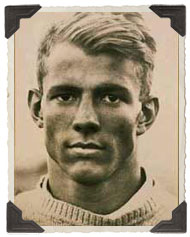
Beard, Peter
Peter Beard is a photographer, artist, diarist, and writer. He introduced Lee Radziwill to the Maysles, and recommended that they work with her on the planned documentary of the Bouviers (which the Maysles later famously scrapped in favor of making Grey Gardens). He was a loyal friend to Jackie Kennedy, and taught her how to take photographs. His photographs of fashion models, African animals, and the journals that often integrate his photographs have been widely shown and published since the 1970’s. Aristocratic and adventure-loving, Beard (his great-grandfather started a railroad, his grandfather invented the tuxedo) was a Yale man once married to supermodel Cheryl Tiegs. Besides his house near the lighthouse in Montauk, he owns a ranch in Kenya, and also is credited with discovering supermodel Iman, who hails from Somalia. He was once nearly killed by an elephant, which charged and crushed him in 1996. He wrote the forward to the upcoming book, Edith Bouvier Beale of Grey Gardens: A Life In Pictures. His website is www.peterbeard.com.
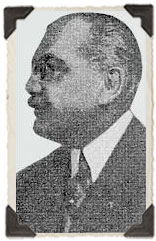
Bouvier, John Vernou, Jr. (1865-1948)
John Vernou Bouvier, Jr. (aka “The Major”) was proud patriarch of the Bouviers, the father of Big Edith, William “Bud”, John III, and red-headed twins Maude and Michelle. He was the grandfather of Little Edie, Bouvier “Buddy,” Phelan Jr., Lee, and Jackie (his favorite). He graduated with honors from Columbia University Law School (he was the first in his family to attend college), became a trial lawyer, and was so successful that he opened his own firm (to which Edith’s husband, Phelan, became a law partner). He was so highly regarded that he was appointed Major Judge Advocate for the Army during World War I. Henceforth, he delighted in being addressed as Major Bouvier. In 1890, he married Maude Sargeant, the beautiful, English-born daughter of a wealthy paper manufacturer. He purchased the family home Lasata, strategically situated near the ocean and the Maidstone Club, with his wife’s money in 1925. The bulk of his wealth, however, came from his association with his uncle, M. C. Bouvier, a Wall Street tycoon for whom he put aside his law practice and worked, to their mutual financial advantage.
As consequential as wealth and military title were for him, neither satisfied the Major’s constant ambition to improve his social status. He successfully sought membership in Manhattan’s Union and Racquet Clubs and, on Long Island, the Maidstone and Piping Rock Clubs. A proudly American, flag-waving Republican, his name was also on the roster of fashionable associations in Washington, D.C., Florida and Cuba. The Major typified a sort of Victorian refinement: his hair was trimmed twice weekly; he was a stylish dresser; his mustache was carefully groomed and waxed until the points stood out beyond his cheeks; he preserved an immaculate physique even into his 60’s. He would often turn off both of his hearing aids and ignore the noisy, constant bickering of his family.
Apparently unsatisfied with the family genealogy, he eventually privately printed a little book called Our Forebears in which, with shameless magnitude, he invented the most outrageous accounts of a noble Bouvier ancestry (the line, “The hallmark of aristocracy is responsibility” comes from this book). His elaborate, mythical history indicates that the Bouviers were descended from French nobility. Though, from actual documentation, the Bouviers had apparently been lowly drapers, tailors, glovers, farmers and domestic servants (the very name Bouvier means cowherd). Nevertheless, long after the Bouvier history had eventually been debunked, Little Edie was still telling reporters in the 1970’s that the family descended from French kings. At the time of the Major’s death, Big Edie was all but disinherited from what little remained of the Bouvier family fortune, having been left only a small trust fund of $65,000 from her father.
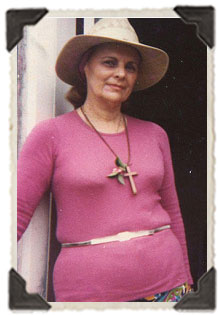
Francisco, Doris (1925-2007)
Doris Francisco grew up in Connecticut, and was married to Don Francisco, Jr., a member of a prominent East Hampton family (her father-in-law was Don Francisco, Sr., a dynamic adman whose work for Sunkist Growers in the 1920s made California oranges and orange juice a new breakfast ritual in America). She was on the board of the Westport Country Playhouse, a non-profit theater group in Connecticut that offers intern and apprenticeships to aspiring artists. Through her Greenwich social connections she became friends with many renowned performers including Frank Sinatra, Bette Davis, and Paul Newman. She and her husband eventually moved to East Hampton to be near his family. Like the Beales, they socialized at the Maidstone Club. Her husband died in 1969, and she became friends with the Beales and Lois Wright in the 1970’s (read Lois’ book for further details). Doris often graciously took care of Big Edie, the house, and the cats when Little Edie was out promoting the documentary or Brooks was unavailable. Lois and Doris became close friends, and talked several times a day over the phone later in life. She was a detailed, private person, and had a talent for telling extraordinarily entertaining stories. Michael Sucsy and Drew Barrymore visited her in 2006 in preparation for the HBO film. She is buried in Cedar Lawn Cemetery in East Hampton.
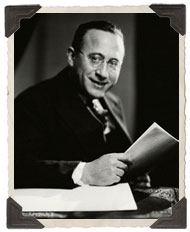
Gordon, Max (1892-1978)
Max Gordon was an American theatre and film producer. Little Edie claimed that in 1952 Gordon was going to give her the “big break” in show business that she had craved; unfortunately, Edie was forced to move back to Grey Gardens, instead. The native New Yorker started his career as a press agent for Hyde and Behman, later becoming a vaudeville agent. In the 1930’s and during much of the 1940’s he was one of Broadway’s most successful producers, and is credited with discovering Judy Holiday. Gordon was producer of the original stage production of The Jazz Singer, as well as Three’s A Crowd, Ethan Frome, and Junior Miss. Gordon was known for his unpredictable behavior, once perching himself on a window ledge and threatening to jump if money was not forthcoming for a new production. For more information, check out his autobiography, Max Gordon Presents.

Helmuth, Jack, III
Little has been written about Jack Helmuth III. We know that he was a good friend of the Beales for 50 years and that he would often visit and drive them around town for errands. He is in the birthday party scene with Lois in the documentary.

Hyers (or Hiers), Brooks
Brooks Hyers was the “gardener,” cook, maintenance man, security guard, and jack of all trades for many years at Grey Gardens. Edie said he was a former athlete from Florida and that he was raised by nuns. He was around 40 years old when he started working for the Beales in 1971 after the raid. At the time the Maysles documentary was filmed he worked mainly outside; the Maysles paid him $10 to film him cutting the grass. Though loyal to the Beales, he had a severe drinking problem and his presence in the home often did more harm than good. Little Edie often suspected him of stealing treasures from the house. His character was depicted in Grey Gardens: The Musical. Although his family still lives in East Hampton, not much has been written about his life or how he died.
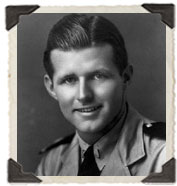
Kennedy, Joe, Jr. (1915-1944)
Joseph Kennedy, Jr. was a U.S. Navy aviator and the older brother of future president John F. Kennedy; as the oldest son, he was expected to bear the family’s political hopes at becoming president. However, he died in a secret WWII Nazi air mission when the plane he was flying exploded. Very few parts of the plane were discovered and no bodies were found. The accident was shrouded in mystery. The Germans claimed they shot the plane down, and that Joe was captured and later killed in an escape attempt. Other claims were that Joe parachuted and was captured by a Panzer division, and later he was shot. To this day there are still unanswered questions. Another mystery is whether or not he was ever actually engaged to Little Edie Beale. Popular belief is that she was, and Edie certainly encouraged the belief. However, there is no solid evidence that this was ever the case. It was reported that Edie reminded Joseph Kennedy, Sr. at John’s inauguration that she was almost engaged to his deceased son. Nevertheless, the scene of Joe’s engagement to Edie is portrayed in Grey Gardens: The Musical.
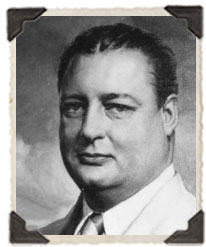
Krug, Julius (1907-1970)
Julius “Cap” Krug was Little Edie’s one true love and is the “married man” that Big Edie refers to in the documentary. Little Edie had an affair with Krug while she was living at the Barbizon in New York and never got over him. “Mr. Krug’s Ghost” often prevented Edie from dating other men. A tall, heavy man of 300 pounds, he was U.S. Secretary of the Interior under President Harry Truman. A 1929 graduate of the University of Wisconsin, he received his M.A. in 1930, and was employed by several communication and utility authorities. In April 1944, he enlisted in the United States Navy but in August was recalled to Washington to serve as acting chairman of the War Production Board. In 1946 Krug was appointed by Harry S. Truman to succeed Harold I. Ickes as Secretary of the Interior. In that position he also served as United States coal mines administrator. He unsuccessfully negotiated with John L. Lewis and mine owners in an effort to end a two-month nationwide strike by the United Mineworkers of America. As Secretary of the Interior, he opposed attempts by lumber interests to log huge forests in the state of Washington and resisted the building of unnecessary and unsightly dams. Krug resigned from the Cabinet in November 1949. He is buried at Arlington National Cemetery. His character is portrayed by Daniel Baldwin in the HBO feature film.

Logan, Tom (1906-1964)
Tom (aka “Tex”) Logan was a steel guitar playing bachelor and former chef at the Sea Spray Inn in East Hampton. He was eventually fired and came to live with the Beales for approximately nine years as a pseudo carpenter/maintenance man/cook/caretaker. Tom and Big Edie may have been lovers (he was reportedly infatuated with her). He had a drinking problem, and would often leave the home to hitchhike around town for short periods of time. After another absence, he came back to Grey Gardens very ill; a week later, he died of pneumonia in the kitchen. His ghost is said to have haunted Grey Gardens, and Little Edie often blamed the spirit for mysterious happenings in the house. He is buried at Cedar Lawn Cemetery in East Hampton.
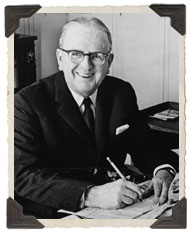
Peale, Norman Vincent (1898-1993)
Dr. Norman Vincent Peale was a Protestant preacher and author (most notably of The Power of Positive Thinking). Peale started a radio program, “The Art of Living,” in 1935, which lasted for 54 years. Under sponsorship of the National Council of Churches he moved into television broadcasts. In the meantime, he founded the magazine Guideposts and started to write books. Big and Little Edie Beale listened to his radio show, and one of his sermons called “Try, Really Try!” appears in the documentary. His character is portrayed in Grey Gardens: The Musical.
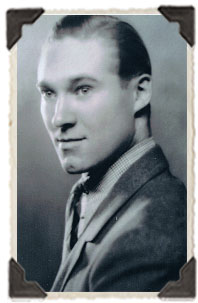
Strong, George Gould (1910-1963)
George Gould Strong was Big Edie’s accompanist, songwriter, social companion, confidante, and soul mate. He attended Syracuse University for two years, and then went to Rutgers University. After leaving college he worked for the National Broadcasting Company (NBC) in New York. A talented pianist and composer, he performed on the radio and at cabarets in New York and Paris. When Gould met Edith in the late 1930’s, the Bouvier name was still associated with great wealth and social status. He is said to have dedicated over 80 songs to her. He may have lived at Grey Gardens for a short period of time. Though the musical depicts him as a flamboyant homosexual, his family staunchly disputes that he was gay. Lois Wright describes he and Edith as lovers. It is rumored that the real reason Edith forced Little Edie to come home from New York City was because she was threatening to reveal illicit photos of her mother with Gould to her father. When he died, Gould had been sick for three weeks, reportedly with a bleeding ulcer (he did not commit suicide). His funeral was held at his home on Pantigo Road in East Hampton. His brother Ted left his bedroom untouched for the next twenty years. He is buried in Cedar Lawn Cemetery in East Hampton. Actor Malcom Gets portrays him in the HBO movie.

Torre, Jerry
Gerard Joseph Torre (dubbed the “Marble Faun” by Little Edie) is only one of two surviving cast members from the original Maysles documentary. Jerry, who is in his early 50’s and lives in Brooklyn, NY, was a cab driver for many years, but is now studying to be a sculptor. At the age of 16 he ran away from home and took a job as a gardener for petroleum magnate J. Paul Getty in East Hampton. It was during that summer of 1974 that he met the Beales at Grey Gardens. Though the edited footage doesn’t show him doing much work around the home, he was employed as a handyman for the Beales. Big Edie was very fond of Jerry and remarked that his facial features reminded her of her mother. There are memorable scenes in the film of him conversing with Mrs. Beale and enjoying her bedside-boiled corn on the cob. Little Edie was somewhat jealous of Jerry, and her mother often used his presence in the home to taunt her. She would sing his praises while insulting Edie at the same time.
No one involved with the documentary had heard from Torre since 1979 (and there were rumors that he was deceased), but he was “found” in 2005 after one of the passengers in his cab told him that Albert Maysles was looking for him. His story and recollections were featured in The New Yorker and Newsday, but many Grey Gardens aficionados (including Lois Wright) have disputed many of his claims. His character was depicted in Grey Gardens: The Musical, and he even has his own featured song, “Jerry Likes My Corn” (though, he says he didn’t!). He attended the Tony Awards in 2007. He is a gracious person, and you can find him happily corresponding with fans on his Facebook page. He is writing a book about his life, which will include his time working for the Saudi royal family in Riyadh, and the summer in Provincetown he spent in the employ of puppeteer Wayland Flowers. Surprisingly, he was not portrayed in the HBO film.
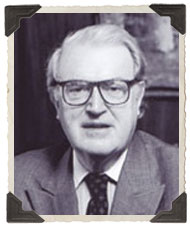
vanden Heuvel, William
William vanden Heuvel is an attorney, former diplomat, businessman, and author. He became U.S. Attorney General Robert F. Kennedy’s assistant in 1962 and was involved in Kennedy’s political campaigns. He was a trusted friend of Jackie’s, and would accompany Lee to check on the Beales and report back to her and Ari Onassis. After the raid, Jackie hired vanden Heuvel to represent the Beales against the eviction proceedings from East Hampton.
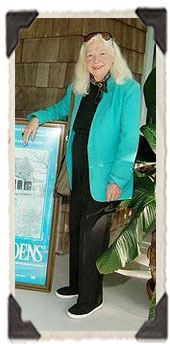
Wright, Lois
Lois Wright is only one of two surviving cast members from the original Maysles documentary. Lois currently lives in East Hampton, NY, where she has resided since the age of 12. Her mother was one of Big Edie’s closest friends, and Lois came to know the Beales over the course of their friendship. To her dismay, she was edited out of most of the documentary (she only appears in the film briefly as a guest at Big Edie’s birthday party). She actually lived at Grey Gardens for 13 months (from 1975 to 1977) and kept a journal of her experiences. The journal was recently released as a book, titled My Life at Grey Gardens: 13 Months and Beyond, and is available through Amazon.com; it is a must-read for Grey Gardens fans. Like the Beales, she is a free spirit (and sweet lady) and her hobbies include painting, horoscopes, and palm reading. She currently hosts her own cable television show in the Hamptons and has devoted several episodes to the Beales and Grey Gardens. She has been very critical of Jerry Torre’s recollections and some of the things he has reportedly said about the Beales. One of her best friends was the late Doris Francisco. Michael Sucsy and Drew Barrymore met with her in East Hampton to discuss the HBO movie.

